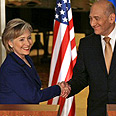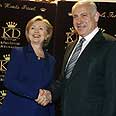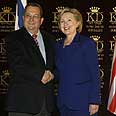


The identical message Israel's leaders made an effort to hammer home as they met with visiting US Secretary of State Hillary Clinton in rapid succession on Tuesday is that Israel expects US President Barack Obama's administration to lead the international charge against the Iranian nuclear threat.
Here on her first official visit since being appointed secretary, Clinton's hectic schedule included meetings
with President Shimon Peres, Prime Minister Ehud Olmert, Prime Minister-designate Benjamin Netanyahu, Defense Minister Ehud Barak and Foreign Affairs Minister Tzipi Livni.
All of whom told Clinton that the progression of Iran's military nuclear program must be halted and that more pressure must be exerted to cut off the supply of missiles and technology to Tehran while combating the funding of terror organizations.
Israel considers Iran its central threat, Clinton was told. Furthermore, Israel also believes that time is running out while Tehran stalls in an effort to establish facts on the ground that will be difficult to change in the future.
Jerusalem is seeking to have Washington set time constraints on dialogue with Iran, and if these should fail the world must impose harsher economic sanctions on the Islamic Republic.
And if this course of action should also fail to yield results, Israel is asking the US to consider military action.
Defense Minister Barak told Clinton during their meeting that Israel would not take any option off the table.
The second track pursued by the Israeli leadership embraces the notion reportedly put forward by President Obama, according to which Russia would prevent the sale of advanced technology and long-range missiles to Iran while in exchange Washington would reconsider its missile defense shield in Europe.
And the third track urges stronger action to prevent the smuggling of arms from Iran to Syria, Hizbullah and Hamas, in accordance with the resolution passed by the UN Security Council.
Clinton made clear during her visit that the Obama administration would continue predecessor George W. Bush's stalwart opposition to an Iran with nuclear might at its military's disposal.
Israel's Ambassador to the US, Salai Meridor, who accompanied Clinton's visit, said Washington had yet to decide whether it would set a deadline for the dialogue with Tehran before moving to harsher sanctions.
As for Russia preventing the sale of long-range missiles and technology to Iran, Clinton confirmed that the proposal was in talks with Moscow.
The secretary said that she has already discussed the matter with Russian Foreign Minister Sergey Lavrov during the Egyptian conference earlier this week on the rehabilitation of Gaza, and that she expects to talk Lavrov again on Friday.
Dispute over Palestinian issue
But while Jerusalem and Washington appear to be in sync regarding Iran, there is a great deal of disparity between the leaderships' view of the stagnated Palestinian peace process.
The first matter of contention is the closure imposed on the Hamas-ruled Gaza Strip.
In her meeting with Barak, Clinton pressed for Israel to open the border crossings to ease the Palestinians' needs, and expressed her concerns regarding the impact the closure has on the humanitarian situation in the coastal territory.
During her joint press conference with Minister Livni the secretary said that it was difficult to discuss the transfer of humanitarian aid to Gaza so long as the rocket attacks against Israel continue, however the Obama administration is expected to continue pressuring Israel on this matter.
Another issue that will likely drive a wedge between the US administration and the future Netanyahu government is the two-state solution favored by Obama and outgoing Prime Minister Ehud Olmert.
Netanyahu was adamant to project a solid relationship with the Obama administration and a lack of US pressure on the Palestinian track, and indeed Clinton did broach the subject during her meeting with him. The secretary did however discuss the two-state solution and the Annapolis process in her other meetings.
US sources made clear that the matter "would be discussed in due time. There is no point in raising the issue before the Israeli government is formed."
The sources stressed Secretary Clinton's message that 'friends must be honest with each other' as testament to Washington's future intentions.
The settlements are another issue related to the Palestinian talks, one that already plagued the
Republican Bush administration and will certainly be on the agenda of the new Democratic one.
Former Secretary of State Condoleezza Rice publically slammed construction in existing settlements, which Olmert's government dismissed as natural growth.
Obama's administration is expected to make things very difficult for an Israeli government that will adopt the right-wing stance regarding the West Bank, that settlements should not be evacuated and that the state should permit construction where in demand.
This without mentioning the matter of the illegal outposts, which former Prime Minister Ariel Sharon had already agreed to dismantle, though most remain untouched.















